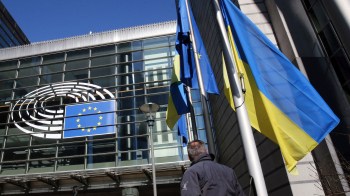Steve Chiotakis: There’s more economic trouble at another European country: Hungary. Both Moody’s and S&P have cut Hungary’s debt to junk status. And its currency — the forint — is starting to collapse. And now the country is talking to the IMF about a new bailout plan. But, Hungary’s troubles are different than Italy’s or Greece’s — because Hungary is not a member of the eurozone.
The BBC’s Nick Thorpe is in Budapest with the latest on that story. Hey, Nick.
Nick Thorpe: Hi Steve.
Chiotakis: Where did the country’s debt troubles come from, Nick?
Thorpe: They really were built up over the previous administration — eight years of socialist and partly socialist, liberal rule. Huge debts ratcheted up and this new conservative government, the Fidesz government, came into power in 2010 with this massive debt burden — the highest per capita in the EU.
That’s what the government’s trying to deal with. Its answer was to try and make the economy grow out of that, to create new job places and so on. But the end result has been everything has got much worse for everybody out on the street because of this near collapse of the Hungarian currency.
Chiotakis: Do you think it’s any better or worse off because Hungary doesn’t use the euro?
Thorpe: This is a moot point. Hungary would like to join the euro one day, despite all the troubles, of course, that the euro’s going through now. But for the time being, it doesn’t satisfy the criteria necessary for that with the EU. So it’s stuck with its own currency. It’s own currency’s very weak.
But even though it’s not part of the eurozone, it’s very dependent on it. It exports almost all… its main exports go to the eurozone, especially to Germany. And at a time when the eurozone’s in trouble — like now — that’s really bad for Hungary. So Hungary’s on the periphery of all that, but it’s getting really battered by the storms within the eurozone.
It really would have needed a calmer situation in the eurozone for it to be able to continue borrowing money from largely eurozone countries, and the United States of course, in order to finance its debt and to climb out of this crisis — sort of up the stairs, as it were.
Chiotakis: The BBC’s Nick Thorpe in Budapest. Nick, thanks.
Thorpe: Thank you, Steve.
There’s a lot happening in the world. Through it all, Marketplace is here for you.
You rely on Marketplace to break down the world’s events and tell you how it affects you in a fact-based, approachable way. We rely on your financial support to keep making that possible.
Your donation today powers the independent journalism that you rely on. For just $5/month, you can help sustain Marketplace so we can keep reporting on the things that matter to you.


















